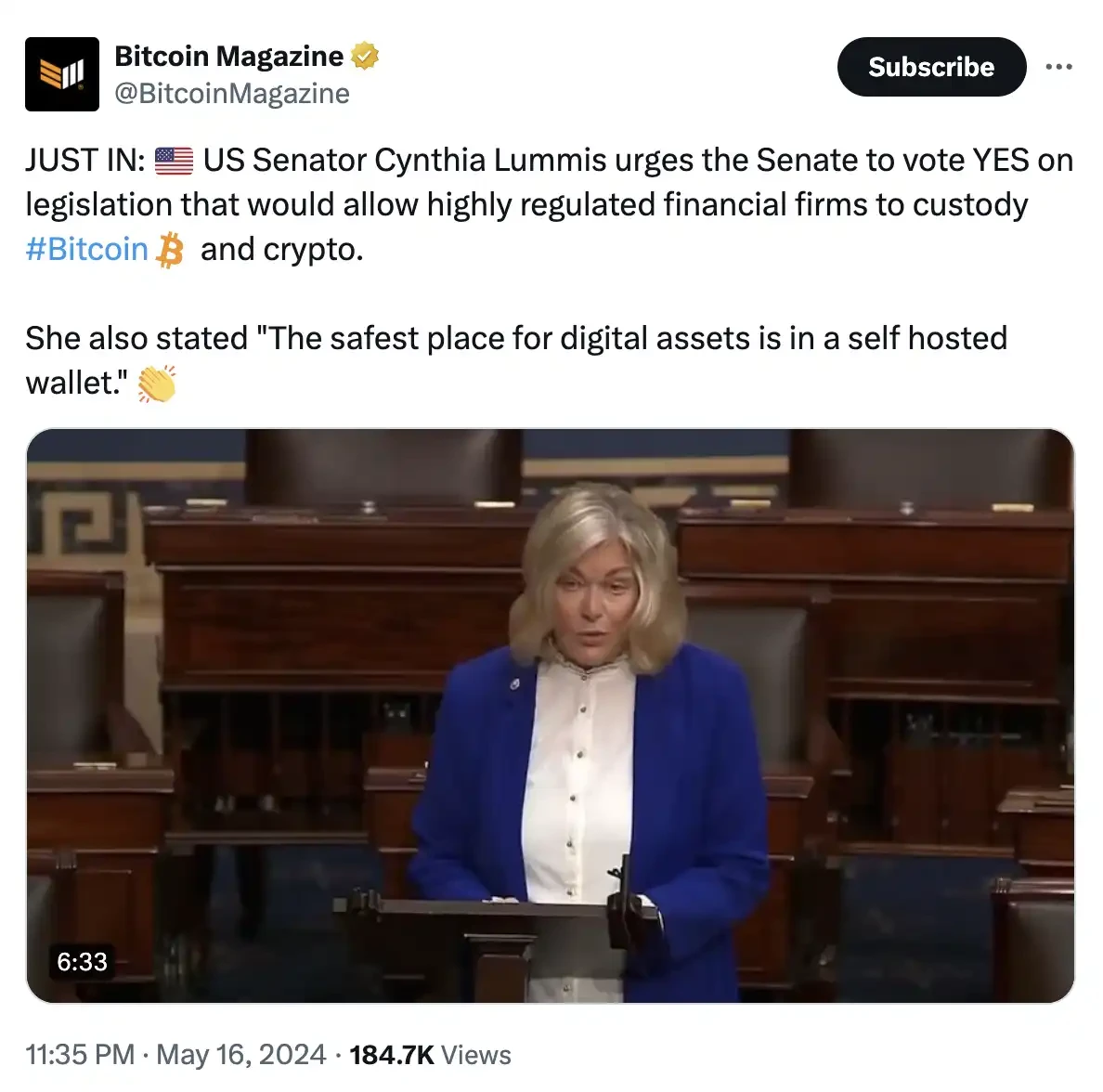Original title: SENATE PASSES BILL TO OVERTURN SEC RULE ON BITCOIN AND CRYPTO CUSTODY, BIDEN THREATENS VETO
Original article by Nik Hoffman, Bitcoin Magazine
Original translation: shushu, BlockBeats
Today, the Senate passed HJRes 109, which would overturn SEC Staff Accounting Bulletin (SAB) No. 121, preventing heavily regulated financial firms from custodial custody of Bitcoin and other cryptocurrencies. The bill passed by a vote of 60 to 38, indicating bipartisan support for the measure.
SAB 121 imposes strict restrictions on financial institutions, prohibiting them from acting as custodians for digital assets such as Bitcoin. Pursuant to the Congressional Review Act, HJRes 109 seeks to remove these barriers, thereby enabling strictly regulated financial firms to provide custody services for Bitcoin and other cryptocurrencies.
However, the White House has made its position on the legislation clear. A recent statement stressed that if the bill reaches President Biden’s desk, he will veto it. The administration believes that overturning SAB 121 will disrupt the SEC’s work to protect investors in the crypto asset markets and the broader financial system.
However, supporters of HJRes 109 believe that overturning SAB 121 is essential to protect American consumers. Much of this stems from a number of spot Bitcoin ETFs that the SEC approved for trading earlier this year. Most of these Bitcoins are held by a small number of institutions, which poses a concentration risk. HJRes 109 aims to remove barriers and allow more strictly regulated institutions to custody and hold Bitcoin on behalf of their clients, thereby helping to alleviate centralization concerns.
Critics of SEC SAB 121 argue that the rule is overly restrictive and hinders the ability of financial institutions to meet the growing demand for Bitcoin services. They argue that regulated institutions are well-equipped to address the risks associated with digital asset custody given their existing compliance frameworks and security protocols.
Senator Cynthia Lummis, an active Bitcoin advocate, supported and urged the overturning of SAB 121 earlier today, stressing that “SAB 21 is a rule under the Administrative Procedure Act disguised as accounting guidance, and it was issued by the SEC staff without the approval of a majority of the Commission.”
However, Senator Elizabeth Warren urged the Senate to align with the Biden administration and vote against it, saying it is a completely different asset class than what banks and other regulated financial institutions are used to. She said it is a completely different asset class than what banks and other regulated financial institutions are used to. Digital assets are not physical objects that banks can store in vaults, they are entirely online, so it is something that can be hacked, citing the hacks of crypto exchanges Binance and FTX as evidence.
Despite Senate approval, the future of HJRes. 109 remains uncertain due to the president’s threatened veto. If President Biden follows through on his promise, this would halt the resolution’s progress, maintaining the status quo for financial institutions to custody digital assets. Biden can choose to sign, veto, or do nothing. If he chooses to do nothing, the bill will go into effect without his signature.
Fox Business News reporter Eleanor Terrett commented on the news, saying: The Senate has voted to overturn SAB 121, and we all know that the president said last week that he planned to veto the bill. If this is the case, it means that the Senate and the House of Representatives are back to square one, and both the Senate and the House of Representatives need a 2/3 majority vote to override a veto.
This article is sourced from the internet: Senate passes bill to overturn SECs SAB 121, cryptocurrency custody restrictions may see a turnaround
関連:シグナルプラスマクロ分析(20240426):第1四半期の米国GDPは予想を大幅に下回った
ニューヨーク取引セッション中、いくつかの好ましくない経済データがリスクセンチメントに影響を与えた。米国の第1四半期のGDPはわずか1.6%増加し、第4四半期の3.4%を大きく下回った。そのうち、個人消費の伸び率は3.3%から2.5%に低下し、商品への支出は3.0%から-0.4%に低下した。在庫(-0.3%)、純輸出(-0.86%)、連邦政府支出(-0.2%)は、いずれも第1四半期の成長率を押し下げた。同時に、デフレーターは3.1%(前回の1.6%)に予想外に急上昇し、2023年第2四半期以来の高水準となり、国内需要は3.1%増加し、唯一の明るい兆しとなった。同時に、第1四半期のコアPCE価格指数の伸びは急上昇し…









